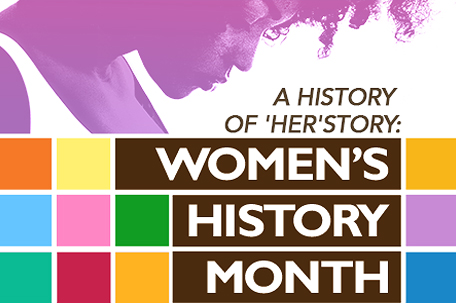
womenshistorymonth.gov
About Women’s History Month
Women’s History Month had its origins as a national celebration in 1981 when Congress passed Pub. L. 97-28 which authorized and requested that President Ronald Reagan proclaim the week beginning March 7, 1982 as “Women’s History Week.” Throughout the next five years, Congress continued to pass joint resolutions designating a week in March as “Women’s History Week.” In 1987, after being petitioned by the National Women’s History Project, Congress passed Pub. L. 100-9 which designated the month of March 1987 as “Women’s History Month.” Between 1988 and 1994, Congress passed additional resolutions requesting and authorizing the President to proclaim March of each year as Women’s History Month. Since 1995, Presidents Clinton, Bush and Obama had issued a series of annual proclamations designating the month of March as “Women’s History Month.”
Executive and Legislative Documents
The Law Library of Congress has compiled guides to commemorative observations, including a comprehensive inventory of the Public Laws, Presidential Proclamations and congressional resolutions related to Women’s History Month.
Other Dedicated Web Sites
• National Endowment for the Humanities: https://edsitement.neh.gov/feature/women-in-war
• National Archives: https://www.archives.gov/news/topics/womens-history
• National Park Service: https://www.nps.gov/subjects/womenshistory/index.htm
• Smithsonian Education: https://womenshistory.si.edu/
• United States Holocaust Memorial Museum: https://www.ushmm.org/information/exhibitions/online-exhibitions/special-focus/womens-history-month
This week we take a look at some of Philadelphia’s extraordinary women and their contributions to their communities and the nation.
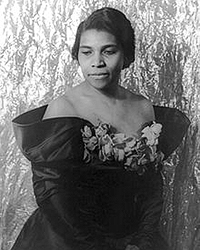
Marian Anderson
Born: February 27, 1897, Philadelphia, Pennsylvania
Died: April 9, 1993, Portland, Oregon
Notable Lifetime Achievements and Events:
1928: Anderson delivers a well- received solo recital at Carnegie Hall
1930: Marian then obtained a scholarship through the National Association of Negro Musicians to study in Britain, kicking off a highly successful international career.
1939: Anderson’s manager Sol Hurok attempts to rent Washington, D.C.’s segregated Constitutional Hall, which was owned by the Daughters of the American Revolution (DAR), in spite of a 1935 clause instituted by the venue which stated that they supported “concerts by white artists only.” Hurok’s request was vehemently denied. First Lady Eleanor Roosevelt resigned from the DAR amidst national outrage in protest. It was her intervention — along with that of Hurok and the NAACP’S Walter White — that encouraged Secretary of the Interior Harold Ickes to arrange a free open-air concert on the steps of the Lincoln Memorial on April 9, which was Easter Sunday that year. The concert drew 75,000 attendees and was broadcast to millions via radio.
1941: After receiving the Bok Award, presented annually to an outstanding Philadelphia citizen, Anderson establishes the Marian Anderson Scholarships with the $10,000 prize money.
1955: Anderson debuts at the New York Metropolitan Opera as Ulricia in Guiseppe Verdi’s “un ballo in maschera” (The Masked Ball) – the first African-American performer to do so, at the age of 58 – the only time she participated in an opera role onstage.
1957: Anderson tours India and the Far East as a goodwill ambassador on behalf of the U.S. State Department and the American National Theater and Academy, and is appointed as a delegate to the United Nations Human Rights Committee by President Dwight Eisenhower.
1963: Anderson performs at the iconic March on Washington for Jobs and Freedom. That same year, President Lyndon Johnson presents Anderson with the American Medal of Freedom.
1965: After a year-long farewell tour, Anderson presents her final concert at Carnegie Hall.
1980: The U.S. Treasury Department coins a half-ounce gold commemorative medal with her likeness.
1986: President Ronald Reagan presents Anderson with the National Medal of Arts.
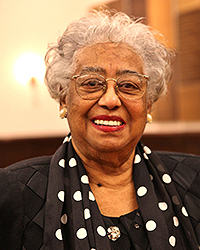
Constance Elaine Clayton, PhD, EdD
Born: 1933, Philadelphia, Pennsylvania
Notable Lifetime Achievements and Events:
1969 -1971: After a 14-year long career as an elementary school teacher and curriculum developer, Clayton heads the School District of Philadelphia’s newly instituted African and Afro-American Studies program
1982: Clayton — a Girls High School graduate — becomes the first woman and first African-American elected to serve as Philadelphia school superintendent, a position she held until 1993.
1992: The Constance E. Clayton Professorship in Urban Education is established at the University of Pennsylvania Graduate School of Education, making Clayton the first African-American woman to have a professorship named for her at an Ivy League institution.
2015: The Constance E. Clayton Fellowship is established to help provide professional curatorial and museum educator experience for graduate students from Historically Black Colleges and institutions.
2019: Clayton — a lifelong supporter of the arts and a member of the Philadelphia Museum of Art’s board of trustees — donates 78 works to the Pennsylvania Academy of the Fine Arts, including pieces by Romare Bearden, former PAFA faculty and alumni like Henry O. Tanner, Laura Wheeler Waring, and others.

Elleanor Jean Hendley
Born: December 28, Savannah, Georgia,
Notable Lifetime Achievements and Events
1985-2005: After earning a Bachelor of Science degree in elementary education and teaching from Central State University and working as a New Jersey public school teacher, Hendley begins her broadcast career at CBS 3 TV in Philadelphia, where she serves as an Eyewitness News education reporter, producer/host of “City Lights”, an award-winning weekend primetime magazine show, and as director of public affairs.
1985: Hendley founds Teenshop, Inc.®, a nationally- recognized nonprofit weekend program that prepares “girls with goals®” for college and careers.
2002: Hendley receives an Emmy award for a feature segment on Black History.
2006: Hendley founds Girls Achieve, an education and lifestyles company empowering adolescent girls through school and camp programs and consumer products.
2019: Hendley serves as a volunteer jazz curator for a monthly Jazz Salon.

Sheryl Lee Ralph Hughes
Born: December 30, 1956, Waterbury, Connecticut
Notable Lifetime Achievements and Events
1981: Ralph begins playing the iconic role of Deena Jones in the Broadway musical “Dreamgirls,” eventually receiving a Tony Award nomination for “Best Actress in a Musical.”
1990: Ralph creates the DIVA (Divinely Inspired Victoriously Aware) Foundation to combat HIV stigma and raise public awareness.
1996: The popular UPN sitcom, “Moesha”, premieres with R&B singer Brandy Norwood in the title role of Moesha Mitchell, and Ralph playing the role as her stepmother, Deirdre “Dee” Mitchell.
2005: Ralph marries Pennsylvania State Senator Vincent Hughes, and becomes involved in many Philadelphia based causes.
2012: Ralph releases her first book, entitled “Redefining Diva: Life Lessons from the Original Dreamgirl”(Simon & Schuster)
2017: Ralph becomes the first African-American actor to play Madame Morrible in “Wicked” at the Gershwin.
2018: Ralph returns to television in the CBS series “Fam.”

Danielle Jeter
Born: October 27, 1998, Philadelphia, Pennsylvania
Notable Lifetime Achievements and Events:
2010: Jeter graduates from Spelman College and focuses on growing her company, AOI Events & PR — which she founded in her senior year. Jeter also starts an internship and mentoring program Pipeline for high school students interested in a media-related career
2013: Jeter launches Women in Media Global Network (WIM Global), an organization that supports women who are currently in the media and communications industry, as well as those who aspire to enter it.
2014: Jeter is named the African American Chamber of Commerce of PA, NJ, & DE’s “Young Professional of the Year”
2015: Jeter is named one of the “Top 10 People Under 40 to Watch in Philadelphia” by the Philadelphia Tribune
2018: Jeter is appointed to the Governor’s Commission on African-American Affairs by Pennsylvania Governor Tom Wolf.
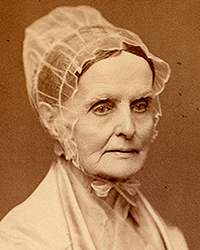
Lucretia Mott
Born: January 3, 1793, Nantucket, Massachusetts
Died: November 11, 1880, La Mott, Pennsylvania
Notable Lifetime Achievements and Events:
1808: While working as a teacher at a Quaker boarding school near Poughkeepsie, New York, Mott learned that she was paid only half the salary her male colleagues received, launching a lifelong commitment to women’s rights issues.
1824: Mott is accepted as a minister of the Religious Society of Friends.
1833: After attending the inaugural convention of the American Anti-Slavery Society, Mott organizes its women’s auxiliary, the Philadelphia Female Anti-Slavery Society, and is chosen as its president.
1848: Mott and fellow activist Elizabeth Cady Stanton call a convention in Seneca Falls, New York to discuss the “social, civil, and religious rights of women.” A “Declaration of Sentiments” modeled on the Declaration of Independence is issued at the gathering, stating that “all men and women are created equal.”
1850: Mott and her husband James open their home to enslaved people seeking freedom via the Underground Railroad.
1880: Mott’s last address is given to the Friends’ annual meeting in May
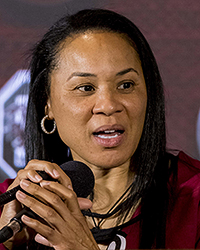
Dawn Staley
Born: May 4, 1970, Philadelphia, Pennsylvania
Notable Lifetime Achievements and Events:
1996: Staley wins a gold medal at the Summer Olympics, the first of three earned throughout her career, then begins her professional career in the American Basketball League and the WNBA. Staley also earns two FIBA World Championship gold medals, one bronze medal and seven international invitational titles from 1989 to 2004.
1997: Staley launches the Dawn Staley Foundation, which sponsors an after-school program at the Hank Gathers Recreation Center. In 2017, she presents a replica NCAA National Championship trophy to the center. The City also renames the street in front of the center in her honor that same year.
2000: Staley begins her coaching career at Temple University
2004: Staley is elected to carry the United States flag at the opening ceremony for the Summer Olympics.
2017: As coach, Staley guides the South Carolina Gamecocks to the first NCAA Women’s Basketball National Championship. That same year, she is appointed coach of the United States Women’s National Basketball Team.
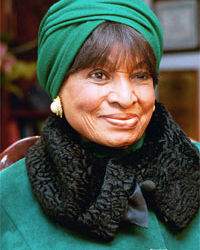
C. Delores Tucker
Born: October 4, 1927, Philadelphia, Pennsylvania
Died: October 12, 2005, Norristown, Pennsylvania
Notable Lifetime Achievements and Events:
1965: Participates in the March in Selma, Alabama alongside the Rev. Dr. Martin Luther King, Jr.
1971: Tucker becomes the first African American Secretary of State in the nation.
1990: Tucker, along with 15 other African-American women and men, founds African-American Women for Reproductive Freedom.
1991: Tucker founds the Bethune-DuBois Institute, Inc. in order to promote the cultural development of African American youth through scholarships and educational programs
1983: Tucker co-founds the Philadelphia Martin Luther King Jr. Association for Nonviolence Inc., a 501(c)(3) organization which is the only affiliate commissioned by Mrs. King and the Martin Luther King Center for Nonviolent Social Change, Inc. in Atlanta, Georgia to promote and perpetuate the nonviolent legacy of Dr. Martin Luther King, Jr. .
1990s: Tucker becomes an outspoken critic of misogynistic, demeaning and violent “gangsta rap” lyrics, sparking virulent pushback from the industry and performers such as the late Tupac Shakur, Eminem, and ‘Lil Kim, among others
2006: It is announced that the North Building in Harrisburg, which is adjacent to the State Capitol Building, is to be renamed the Secretary C. Delores Tucker Building.







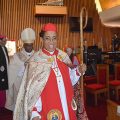









Leave a Comment